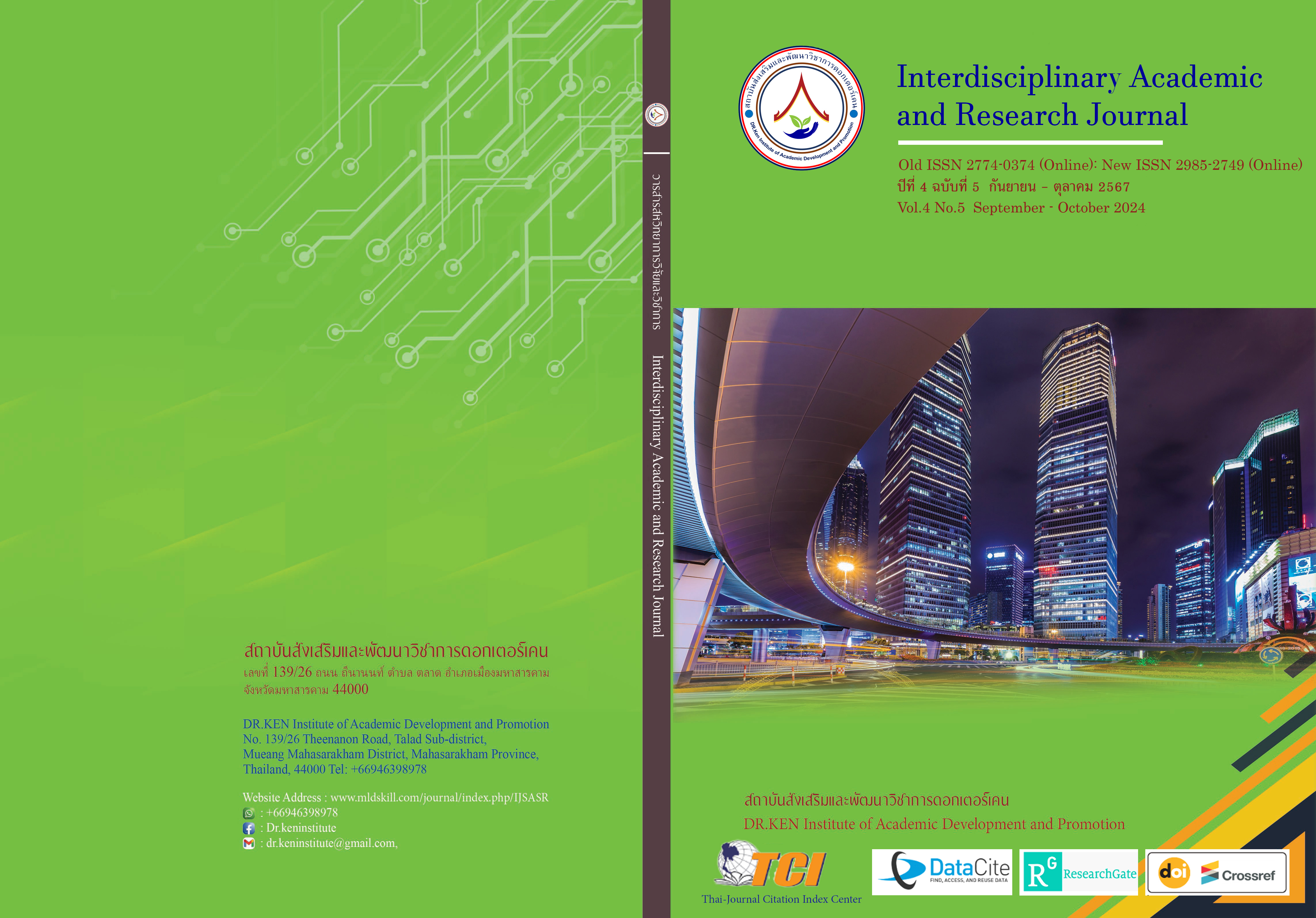Educational Institution Administration Using the Philosophy of Sufficiency Economy under the Jurisdiction of the Chaiyaphum Provincial Learning Promotion Office
DOI:
https://doi.org/10.60027/iarj.2024.276862Keywords:
Philosophy of Sufficiency Economy; , Educational institution administration; , Guidelines for educational institution administrationAbstract
Background and Aims: Education is an important factor that helps develop the people and the nation in every aspect. The Ministry of Education therefore has a policy to develop every educational institution to be able to carry out teaching and learning according to the philosophy of sufficiency economy. Focusing on quality and sustainable development so that the educational institution can be a learning center according to the aforementioned philosophy. Therefore, it is necessary to develop a model for organizing learning activities and school administration in line with the philosophy of the sufficiency economy. This research has three objectives: (1) A study of educational institution administration using the philosophy of sufficiency economy in educational institutions under the Chaiyaphum Provincial Learning Promotion Office. (2) Comparison of educational institution administration using the philosophy of sufficiency economy in educational institutions under the Chaiyaphum Provincial Learning Promotion Office. And (3) a study of guidelines for developing educational institution administration using the philosophy of sufficiency economy in educational institutions under the Chaiyaphum Provincial Learning Promotion Office.
Methodology: The research sample consisted of 280 school administrators and teachers under the Chaiyaphum Provincial Learning Promotion Office. The research tools were questionnaires and interviews. which is a 5-level rating scale. The reliability value was 0.90 and the consistency value (IOC) was in the range of 0.8 to 1.00 for basic statistics used in data analysis, including frequency, percentage, mean, and standard deviation. Statistics used in hypothesis testing include T-test, F-test, and Scheffe's Method.
Results: The results of the research found that (1) the administration of educational institutions using the philosophy of sufficiency economy under the Office of Learning Promotion, Chaiyaphum Province Overall it is at a high level. When considering each aspect, it was found that all aspects of educational institution administration using the philosophy of Sufficiency Economy were at a high level. The side with the highest average is Academic administration. (2) Comparative analysis of educational institution administration using the philosophy of sufficiency economy classified by position Education level and experience in performing budget work, it was found that: 1) Management of educational institutions using the philosophy of sufficiency economy classified by position overall there is no difference. 2) School administration using the philosophy of sufficiency economy. classified by educational level, it was found that overall, there were differences. 3) School administration using the philosophy of sufficiency economy categorized by work experience, it was found that those with less than 3 years of management experience, 3 – 5 years, and more than 5 years had statistically significantly different opinions. (3) Guidelines for developing educational institution administration using the philosophy of sufficiency economy under the Chaiyaphum Provincial Learning Promotion Office. Divided into each area, including general administration, budget management and academic administration.
Conclusion: School administrators and teachers are aware of the importance of school administration using the philosophy of Sufficiency Economy. Under the Chaiyaphum Provincial Learning Promotion Office, there are clear operating procedures. There is coordination and cooperation both inside and outside the educational institution, all sectors, communities and related agencies. Applied in educational operations efficient administration of educational institutions using the philosophy of sufficiency economy according to the context of each educational institution. It will cause the promotion and development of students with good results, being accepted and trusted by the community and society, showing the potential of the educational institution in terms of educational institution administration.
References
กาญจนา วิเชียรศรี, กฤตยากร ลดาวัลย์ และ วิมลพร สุวรรณแสนทวี. (2563). การบริหารจัดการศึกษาตามหลักปรัชญาของเศรษฐกิจพอเพียงในสถานศึกษา สังกัดสำนักงานส่งเสริมการศึกษานอกระบบและการศึกษาตามอัธยาศัยจังหวัดร้อยเอ็ด. วารสารพุทธปรัชญาวิวัฒน์, 4(2), 21-32.
จรรยา ทีปาลา. (2564). แนวทางการบริหารสถานศึกษาตามหลักปรัชญาของเศรษฐกิจพอเพียง อำเภอบ้านไร่สังกัดสำนักงานเขตพื้นที่การศึกษาประถมศึกษาอุทัยธานี เขต 2. วารสารวิจยวิชาการ, 4(3), 45-60.
ณัฐวุฒิ สัพโส. (2564). การบริหารจัดการกิจกรรมการเรียนรู้ตามหลักปรัชญาของเศรษฐกิจพอเพียงของสถานศึกษาในสำนักงานเขตพื้นที่การศึกษาประถมศึกษาพะเยา เขต 1. วารสารวิชาการ คณะมนุษยศาสตร์และสังคมศาสตร์ มหาวิทยาลัยราชภัฏนครสวรรค์, 8(2), 43-58.
ธงชัย ดีมูลพันธ์. (2565). การบริหารสถานศึกษาตามหลักปรัชญาของเศรษฐกิจพอเพียงของสถานศึกษาในสหวิทยศึกษาวังสีทา สังกัดสำนักงานเขตพื้นที่การศึกษาประถมศึกษาสระบุรีเขต 2. การค้นคว้าอิสระ สาขาวิชาการบริหารการศึกษา ระดับปริญญามหาบัณฑิต ภาควิชาการบริหารการศึกษา บัณฑิตวิทยาลัย, มหาวิทยาลัยศิลปากร.
ธิดา เสมอใจ. (2562). กลยุทธ์การบริหารจัดการศึกษาโดยบูรณาการหลักปรัชญาของเศรษฐกิจพอเพียง เพื่อยกระดับคุณภาพชีวิตของนักเรียนกลุ่มชาติพันธุ์ โรงเรียนมัธยมพระราชทานเฉลิมพระเกียรติ สำนักงานเขตพื้นที่การศึกษามัธยมศึกษา เขต 37. งานวิจัย กลยุทธ์การบริหารจัดการศึกษาโดยบูรณาการหลักปรัชญาของเศรษฐกิจพอเพียง โรงเรียนท่าวังผาวิทยาคม.
บุญชม ศรีสะอาด. (2553). การวิจัยเบื้องต้น. (พิมพ์ครั้งที่8). กรุงเทพฯ: สุวีริยาสาส์น.
พระราชบัญญัติส่งเสริมการเรียนรู้. (2566). ราชกิจจานุเบกษา เผยแพร่ พ.ร.บ.ส่งเสริมการเรียนรู้ พ.ศ. 2566 ยกระดับ กศน.เป็นกรมส่งเสริมการเรียนรู้. Retrieved from: https://ratchakitcha.soc.go.th/documents/140A020N0000000006000.pdf.
พิชามญฐ์ แซ่จัน และสุภาภรณ์ ตั้งดำเนินสวัสดิ์. (2561). การบริหารจัดการกิจกรรมการเรียนรู้ตามหลักปรัชญาของเศรษฐกิจพอเพียงของ สถานศึกษาในสำนักงานเขตพื้นที่การศึกษาประถมศึกษาพะเยา เขต 1. วารสารวิชาการ คณะมนุษยศาสตร์และสังคมศาสตร์ มหาวิทยาลัยราชภัฏนครสวรรค์, 8(2), 43-58.
ศักดิ์ดา จันลี และอุรสา พรหมทา. (2563). แนวทางการพัฒนาการบริหารสถานศึกษาโดยใช้หลักปรัชญาของเศรษฐกิจพอเพียง ด้านการบริหารจัดการสถานศึกษา สังกัดสำนักงานเขตพื้นที่การศึกษาประถมศึกษาขอนแก่น เขต 3. วารสารมหาวิทยาลัยราชภัฏมหาสารคาม, 14(2), 57-66.
สำนักงานคณะกรรมการพัฒนาการเศรษฐกิจและสังคมแห่งชาติ. (2562). ยุทธศาสตร์ชาติระยะ 20 ปี (พ.ศ. 2561-2580). พิมพ์ครั้งที่ 2. กรุงเทพฯ : สำนักงานเลขานุการของคณะกรรมการยุทธศาสตร์ชาติ สำนักงานคณะกรรมการพัฒนาการเศรษฐกิจและสังคมแห่งชาติ.
สำนักงานปลัดกระทรวงศึกษาธิการ กระทรวงศึกษาธิการ. (2565). คู่มือการประเมินศูนย์การเรียนรู้ตามหลักปรัชญาของเศรษฐกิจพอเพียงด้านการศึกษา กระทรวงศึกษาธิการ (ฉบับปรับปรุง พ.ศ. 2565). กองส่งเสริมและพัฒนาการบริหารการศึกษาในภูมิภาค สำนักงานปลัดกระทรวงศึกษาธิการ กระทรวงศึกษาธิการ.
สำนักงานส่งเสริมการศึกษานอกระบบและการศึกษาตามอัธยาศัย. (2551). แนวทางการดำเนินการจัดการศึกษานอกโรงเรียน. กรุงเทพฯ.
สุนันท์ รุ่งอรุณแสงทอง และสงวน อินทร์รักษ์. (2562). การบริหารสถานศึกษาขั้นพื้นฐานให้เกิดประสิทธิภาพ. วารสารการบริหารการศึกษา มหาวิทยาลัยศิลปากร, 10(2), 934-944.
Cronbach, L.J. (1990). Essentials of psychological testing. (5th ed.). New York: Harper & Row. pp. 202-204.
Krejcie, Robert V., & Morgan, Daryle W. (1970). Determining sample size for research activities. Education and Psychological Management, 30(3), 607-610.
Downloads
Published
How to Cite
Issue
Section
License
Copyright (c) 2024 Interdisciplinary Academic and Research Journal

This work is licensed under a Creative Commons Attribution-NonCommercial-NoDerivatives 4.0 International License.
Copyright on any article in the Interdisciplinary Academic and Research Journal is retained by the author(s) under the under the Creative Commons Attribution-NonCommercial-NoDerivatives 4.0 International License. Permission to use text, content, images, etc. of publication. Any user to read, download, copy, distribute, print, search, or link to the full texts of articles, crawl them for indexing, pass them as data to software, or use them for any other lawful purpose. But do not use it for commercial use or with the intent to benefit any business.
















.png)


